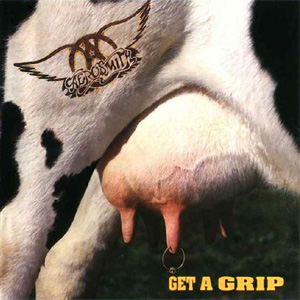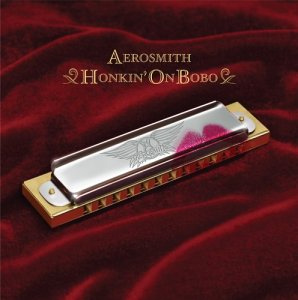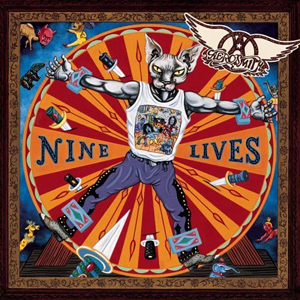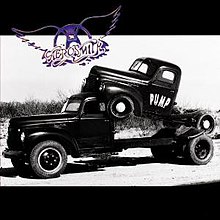
Slippery When Wet is the third studio album by American rock band Bon Jovi. It was released on August 18, 1986, by Mercury Records in North America and Vertigo Records internationally. It was produced by Bruce Fairbairn, with recording sessions between January and July 1986 at Little Mountain Sound Studios in Vancouver. The album features many of Bon Jovi's best-known songs, including "You Give Love a Bad Name", "Livin' on a Prayer", and "Wanted Dead or Alive".

Keep the Faith is the fifth studio album by American rock band Bon Jovi, released on November 3, 1992, by Mercury Records. It is Bon Jovi's last studio album to feature all five original band members as bass guitarist Alec John Such was dismissed from the band in 1994, though it was not his last release with the band. It is Bon Jovi's first album to not be produced by either Lance Quinn or Bruce Fairbairn. The album was produced by Bob Rock and was recorded at the Little Mountain Sound Studios in Vancouver, British Columbia. Keep the Faith marked a change to a "more serious interpretation of the band's pop-metal groove". It is also Bon Jovi's longest album to date, clocking in at 66 minutes.

Aerosmith is an American rock band formed in Boston in 1970. The group consists of Steven Tyler (vocals), Joe Perry (guitar), Tom Hamilton (bass), Joey Kramer (drums), and Brad Whitford (guitar). Their style, which is rooted in blues-based hard rock, has also incorporated elements of pop rock, heavy metal, glam metal, and rhythm and blues, and has inspired many subsequent rock artists. Aerosmith is sometimes referred to as "the Bad Boys from Boston" and "America's Greatest Rock and Roll Band". The primary songwriting team of Tyler and Perry is sometimes referred to as the "Toxic Twins".

Steven Victor Tallarico, known professionally as Steven Tyler, is an American singer, best known as the lead singer of the Boston-based rock band Aerosmith, in which he also plays the keyboards, harmonica and percussion. He has been called the "Demon of Screamin'" due to his high screams and his powerful wide vocal range. He is also known for his on-stage acrobatics. During his performances, Tyler usually dresses in colorful, sometimes androgynous outfits and makeup with his trademark scarves hanging from his microphone stand.

Get a Grip is the eleventh studio album by American rock band Aerosmith, released in April 1993 by Geffen Records. Get a Grip was the band's last studio album to be released by Geffen before they returned to Columbia Records.

Just Push Play is the thirteenth studio album by American rock band Aerosmith, co-produced by song collaborators Marti Frederiksen and Mark Hudson and was released on March 5, 2001. Just Push Play debuted at No. 2 within the Billboard 200, selling over 240,000 copies in its first week, and was certified Platinum by the Recording Industry Association of America within a month of its release.

Honkin' on Bobo is the fourteenth studio album by American rock band Aerosmith, released on March 30, 2004, by Columbia Records. The album includes 11 covers of blues and blues rock songs from the 1950s and 1960s, with one new song, "The Grind". The album pays tribute to Aerosmith's earliest influences and showcases a rawer sound when compared to their more recent commercial efforts. Honkin' on Bobo was produced by Jack Douglas, who was Aerosmith's producer on a vast majority of their 1970s output.

O, Yeah! Ultimate Aerosmith Hits is a greatest hits album by American hard rock band Aerosmith, released in 2002 by Columbia Records and Geffen Records. A double-disc album, it includes 27 of the band's biggest hits in chronological order and spans the band's entire career up to 2002. Also included are a guest appearance on Run-DMC's cover of "Walk This Way" and two new songs, "Girls of Summer" and "Lay It Down", which the band recorded in Hawaii.

The Razors Edge is the twelfth studio album by Australian rock band AC/DC. Released on 24 September 1990, through Albert Productions/CBS Records International in Australasia and Atlantic Records in Europe, it was recorded in 1990 in Little Mountain Sound Studios in Vancouver, Canada, and was mixed and engineered by Mike Fraser and produced by Bruce Fairbairn. It was a major comeback for the band, featuring the hits "Thunderstruck", "Are You Ready" and "Moneytalks". This is the only studio album to feature Welsh drummer Chris Slade, who was the drummer for AC/DC from 1989 to his dismissal in 1994.

Nine Lives is the twelfth studio album by American rock band Aerosmith, released on March 18, 1997. The album was produced by Aerosmith and Kevin Shirley, and was the band's first studio album released by Columbia Records since 1982's Rock in a Hard Place. In the United States, it peaked at number one on the Billboard 200 and sold over two million copies. One of the album's singles, "Pink", won a Grammy Award for Best Rock Performance by a Duo or Group with Vocal. Until Music from Another Dimension!, Nine Lives was their longest album, at 63 minutes.

A Little South of Sanity is a live album by American hard rock band Aerosmith, released on October 20, 1998, by Geffen Records. The two-disc album features recordings taken while the band was on the Nine Lives Tour, which began in 1997 and was still ongoing at the time of the live album release, and the Get a Grip Tour, which the band was on tour with from 1993 to 1994.

Big Ones is a compilation album by American rock band Aerosmith, released on November 1, 1994 by Geffen Records. Big Ones features 12 hits from the band's three consecutive multi-platinum albums, Permanent Vacation (1987), Pump (1989), and Get a Grip (1993), as well as the hit "Deuces Are Wild" from the compilation The Beavis and Butt-Head Experience (1993), and two new songs, "Blind Man" and "Walk on Water", which were recorded during a break in the band's Get a Grip Tour. These songs were also included on the band's 2001 compilation album, Young Lust: The Aerosmith Anthology. Big Ones is the band's second best-selling compilation album, reaching #6 on the Billboard charts, and selling four million copies in the United States alone. The album quickly became a worldwide hit reaching the Top 10 in nine countries before the end of the year.

Young Lust: The Aerosmith Anthology is a 2001 compilation album by American hard rock band Aerosmith. It features album cuts and hits from their Geffen Records years – between Done with Mirrors and Get a Grip – plus rarer material, B-sides, and live versions. It was reissued in 2005 as Gold, with a different cover.

"Janie's Got a Gun" is a song by American rock band Aerosmith and written by Steven Tyler and Tom Hamilton. The song was released as the second single from Pump in 1989, peaking at number four on the US Billboard Hot 100 and number two on the Billboard Album Rock Tracks chart in 1990. In Australia, the song reached number one, becoming Aerosmith's first of two number-one singles there. It also reached number two in Canada, number 12 in Sweden, and number 13 in New Zealand.

American rock band Aerosmith has released 15 studio albums, six live albums, 16 compilation albums, two extended plays, and 72 singles. Aerosmith was formed in Boston, Massachusetts in 1970 by vocalist Steven Tyler, guitarists Joe Perry and Ray Tabano, bassist Tom Hamilton, and drummer Joey Kramer. Tabano was replaced by Brad Whitford in 1971. Other than a period from 1979 to 1984, this lineup has remained the same.

"Love in an Elevator" is a song performed by American rock band Aerosmith, written by Steven Tyler and Joe Perry. It was released in August 1989 as the lead single from their third album with Geffen Records, Pump, released in September. It peaked at No. 5 on the Billboard Hot 100 and reached No. 1 on the Hot Mainstream Rock Tracks chart. The RIAA certified it gold.

Devil's Got a New Disguise: The Very Best of Aerosmith is a compilation album by American hard rock band Aerosmith released on October 17, 2006. It has sold more than 265,048 copies in the U.S. as of May 2008.

"What It Takes" is a power ballad by American rock band Aerosmith. Written by Steven Tyler, Joe Perry, and Desmond Child, it was released in 1989 as the third single from the critically and commercially successful 1989 album Pump. "I'll put some ballads on an album," Tyler remarked, "if that's what it takes so that some young kid can get to hear a 'Young Lust' or 'F.I.N.E.*'."

Tough Love: Best of the Ballads is a 2011 compilation album by Aerosmith. The album was announced on March 30, 2011, and was released on Geffen Records on May 10, 2011.

Music from Another Dimension! is the fifteenth and latest studio album by American rock band Aerosmith, released on November 6, 2012, by Columbia Records. Their first studio album since 2004's Honkin' on Bobo, as well as the first to feature all-new material since 2001's Just Push Play, its release marks the longest gap between Aerosmith's studio albums. The album was released in a single CD edition, along with a deluxe version. It is the last album in Aerosmith's recording contract with Sony/Columbia Records and was produced by Jack Douglas, Steven Tyler, Joe Perry, and Marti Frederiksen. It is also their longest studio album with total track time of nearly 68 minutes.















